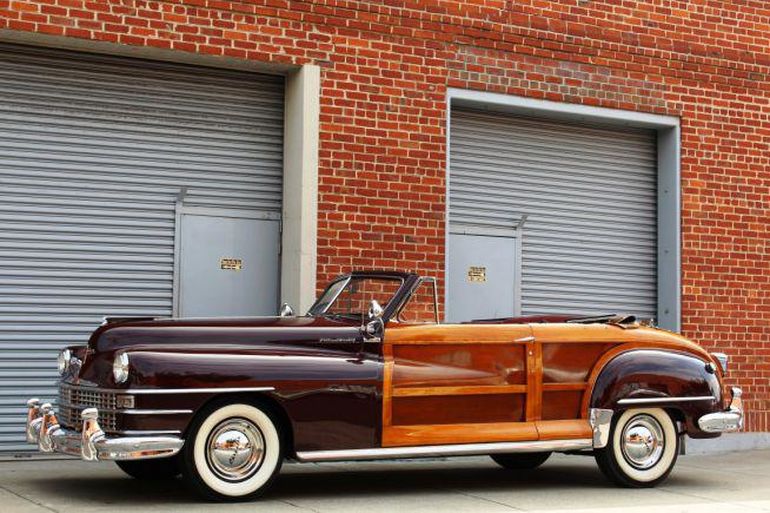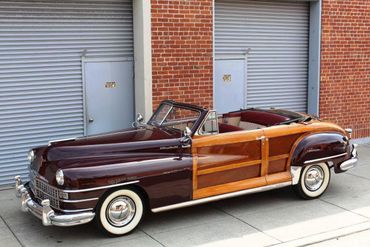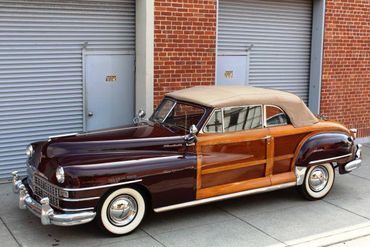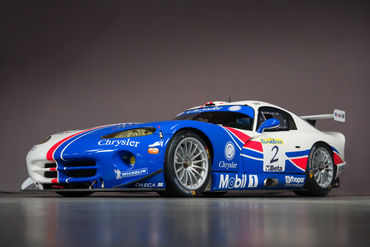Sold
SOLD 01/17
1947 Chrysler
New Yorker Town and Country Convertible
Nicely Mellowed Restoration Completed in 1995. Wood Embellished Doors and Trunk, Adjustable Spotlights, Radio.
- VIN7402135
- Exterior ColorDeep Burgundy
- Interior ColorRed and Tan
- Mileage85746 Miles
- Engine323 c.i. Straight-Eight
- Transmission4-Speed Column Shifter
- StatusSold
- StockFJ2011
Description
1947 Chryslser Town & Country New Yorker Convertible
s/n 7402135 Body no. 3154
Burgundy with Dark Red and Tan Interior
In an age of hand-crafted beauty, excellence, and pride, Chrysler built some of the most elegant and affordable luxury cars. For those seeking a car to enhance their sophisticated country lifestyle, nothing could complete with the combination of presence and adventure like the Town & Country.
The tradition of exposed woodwork has been a part of automotive coachwork dating back to the earliest automobile designs. The first automobiles were hand built with wood frames and stretched materials over wooden framework. Over time, as steel production stampings improved and hydraulic presses allowed for mass production, wood became more of a decorative treatment. But in the late 1940’s, wood still offered a mass manufacturer a way to extend model variety using minimal tooling and artisanal hand labor. For wagons, coupes, and convertibles, using wood as decorative structure was both financially viable and market-savvy.
Chrysler introduced the Town & Country in 1941 as a wood-bodied, barrel-back sedan. Offered within their Royal line, featuring the in-line eight-cylinder came loaded with high-end features and refined finishes. Unlike most wood-bodied utility vehicles of the period, Chrysler’s Town & Country sported lavishly varnished woods, quality upholstery, and chrome plated art-deco trim. Chrysler foresaw a market for an upscale production-based automobile that would attract wealthy buyers seeking both the Town and Country driving experience – pre-dating the modern SUV by decades. The Town & Country offered buyers a sophisticated alternative to production models, elegant for city and chauffeur driving yet sufficiently utilitarian for country living. Designers created a wood-bodied car with the same basic lines as contemporary Chrysler steel-bodied sedans, yet with greater refinement, quality and a bespoke interior, reminiscent of wealthy country estates. As Chrysler had done with their prewar station wagons, assembly was achieved using structural white ash, accented by contrasting panels of rich Honduran mahogany. All this was finished similar to fine furniture with exposed finger joinery, complex contours, and refined but sturdy hardware.
Built on the New Yorker’s 127.5-inch wheelbase, the Town & Country convertible was longer than the sedan, and included all the New Yorker features: Five-main-bearing 323.5-cid, 135-hp straight-eight engine, Prestomatic Fluid Drive semi-automatic transmission and an electric clock. Although production totals were not officially recorded, between 1946 and1948, it is estimated that as many as 8,368 New Yorker Town & Country convertibles were built, but fewer than 500 are known to have survived today. The hand-made process however did not last as demand for station wagons grew and new methods of production had to be developed. By the mid 1950’s and into the 70’s, the name “Town & Country” had become more of a brand name than a statement of elegance, resulting in steel-bodied station wagons and minivans with plastic trim and adhesive wood finishes; a far cry from the handmade offerings of the past.
This 1947 Chrysler Town & Country Convertible, (Model C-39), is presented in deep burgundy with contrasting red and tan interior, and fitted with a tan canvas soft-top. The initial presence of this car instantly puts a smile on your face. Although it is an older restoration, the sheer scale and magnitude of this car is almost beyond description. The lavish art-deco chrome trim and crisp whitewall tires are wonderfully contrasted against the rich wood finishes and deep burgundy paint. Restored in 1995 by Ragtops of Florida, the car has been enjoyed and maintained. The paint remains in good condition overall with good gloss throughout. There are several chips along the inner edges of the right and left fender as the hood closes against the cut line, and minor stone chips at the front of the car. Throughout the car there are minor paint flaws but overall presentation is consistent for driver quality. The chrome and stainless trim are in good condition overall but some parts are showing pitting and much of the grille trim is presentable but fading. The wood finish has been very well maintained. During the restoration process it appears that the car was very well sorted and the wood was properly finished. There is no evidence of excessive finger-joint gaps, joint failures, or excessive flaking in the finish. There are only minor areas of crazing due to sun exposure. The doors open and close but will need to be adjusted for better latching and seam fit. Prior to restoration, the car appears to have been very well cared for by enthusiastic owners. Both light and dark wood finishes are well maintained and retain the glossy varnish in keeping with the elegance of these handmade cars. The glass and various exterior lenses are all in good condition, and the optional dual spotlights rotate smoothly.
The interior is beautifully appointed with two-tone red and tan seats which create plush “library chair” seating for both front and rear passengers. It should be noted that the seating is wide and comfortable, with both seats capable of holding three passengers in a row. The seat material is in serviceable shape with no major tears, however some areas are beginning to show signs of wear. The interior overall would benefit from the addition of new carpet as some areas are worn. The dashboard, instruments, and steering wheel are a visual delight of the period. Chryslers “Juke Box” styling comes to life with chrome plated trim, painted details, and art-deco instrumentation that glows quietly in the evening light. The trunk is properly finished in keeping with originality. The convertible top is showing some areas or wear with light toning and some edge wear.
The engine compartment was properly restored some years ago and is now showing signs of use. Finishes are faded but not abused, and generally the engine area holds up well, but is not of show condition and would benefit from cosmetic attention. That said, all mechanical features appear to operate as expected. Underside continues the same visual theme as the engine compartment with no major damage of note but with finishes consistent with several years of use since the restoration was completed.
The car starts and runs smoothly with a quiet idle and gentle manner. Engaging the Fluid Drive is simple and novel when first starting out. Once in motion, the car shifts and operates much like an automatic transmission, with high speed engaged by lifting your foot from the gas pedal. A low gear can be manually selected for more brisk starts, then manually shifting to the automatic mode. Ride and acceleration are leisurely and cloud-like. Braking is consistent with technology of the times and non-power steering takes some effort given the wheelbase length and weight. However, once at speed in the Town & Country, one is reminded that these sturdy cars are lofty agents of tranquility with the power not to speed forward, rather to transport you back to a simpler time. These elegant cars are often seen in sports car collections as they offer estate decor with ample room for guests. This particular car has been part of an amazing collection, keeping company with a 250 GTO, Pontoon Testa Rosa, and Alfa Romeo 8C.
A distinctive elegance accompanies these uncommon and dazzling Town & Country models as your driving experience unfolds. The surrounding luxury, and country charm remind you that these beautiful coachbuilt post-war New Yorkers are every bit as much about an elegant past as they are an invitation to grab a wicker picnic basket filled with decadent delights, set a course for a quiet country road, and treat yourself to a little bit of Town & Country luxury.
The above vehicle information is complete and accurate to the best of our knowledge at the time it is posted to this website. Corrections or additional information is always appreciated. All advertised prices exclude government fees and taxes, any finance charges, any dealer document preparation charge, and any emission testing charge. Vehicles are subject to prior sale. All advertised to be true but not guaranteed. We assume no liability for errors or omissions.
Inquire About This Car
Fantasy Junction • 510-653-7555 • 1145 Park Ave, Emeryville, CA 94608



